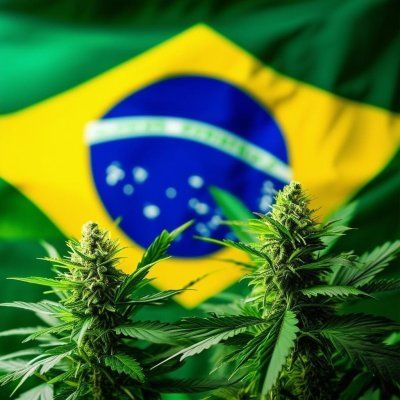Brazil's Supreme Court has ruled to decriminalize cannabis possession for personal use, marking a significant shift in the country's drug policy. While not legalizing cannabis outright, this decision aims to reduce penalties for possession of small amounts.
On Tuesday, eight of the eleven top court judges voted to classify possession of small quantities of cannabis as an "illicit act" that doesn't warrant criminal prosecution. The court is now set to determine the threshold that distinguishes casual users from traffickers, with proposals suggesting up to 60 grams.
This case, which began in 2015, was brought to the Supreme Court by lawyers defending a prisoner who received an additional sentence for concealing three grams of cannabis in his cell. The trial faced multiple interruptions over the years.
Activists and legal scholars have long advocated for this change, arguing that current laws often result in users being convicted of trafficking for possessing small amounts of drugs. Critics highlight that these individuals are often incarcerated in overcrowded prisons and forced to join prison gangs.
Brazil's 2006 drug law criminalizes drug possession for personal use but doesn't specify quantities, leaving this determination to the discretion of law enforcement and judges. Proponents of decriminalization argue that this ambiguity reinforces bias, particularly against poor and Black individuals.
A study by the Brazilian institute Insper found that Black individuals caught with drugs were slightly more likely to be charged as traffickers than their white counterparts, based on analysis of 3.5 million records from 2010 to 2020.
Brazil has the third-highest prison population globally, with nearly 25% of its 852,000 inmates arrested for drug-related offenses as of December 2023.
While adult recreational use remains illegal, medical cannabis with low THC content is available, though access remains contentious. Last year, the Supreme Court allowed some patients to grow cannabis for medical purposes.
Concurrently, the Senate has introduced a constitutional amendment to criminalize marijuana possession in any quantity, which has been approved by the Constitution and Justice Committee.
This decision puts Brazil in line with several other countries that have recently decriminalized recreational cannabis use, although full legalization remains rare. Uruguay was the first Latin American country to legalize cannabis in 2013, while in Europe, Germany, Malta, and Luxembourg have also taken steps towards legalization.
On Tuesday, eight of the eleven top court judges voted to classify possession of small quantities of cannabis as an "illicit act" that doesn't warrant criminal prosecution. The court is now set to determine the threshold that distinguishes casual users from traffickers, with proposals suggesting up to 60 grams.
This case, which began in 2015, was brought to the Supreme Court by lawyers defending a prisoner who received an additional sentence for concealing three grams of cannabis in his cell. The trial faced multiple interruptions over the years.
Activists and legal scholars have long advocated for this change, arguing that current laws often result in users being convicted of trafficking for possessing small amounts of drugs. Critics highlight that these individuals are often incarcerated in overcrowded prisons and forced to join prison gangs.
Brazil's 2006 drug law criminalizes drug possession for personal use but doesn't specify quantities, leaving this determination to the discretion of law enforcement and judges. Proponents of decriminalization argue that this ambiguity reinforces bias, particularly against poor and Black individuals.
A study by the Brazilian institute Insper found that Black individuals caught with drugs were slightly more likely to be charged as traffickers than their white counterparts, based on analysis of 3.5 million records from 2010 to 2020.
Brazil has the third-highest prison population globally, with nearly 25% of its 852,000 inmates arrested for drug-related offenses as of December 2023.
While adult recreational use remains illegal, medical cannabis with low THC content is available, though access remains contentious. Last year, the Supreme Court allowed some patients to grow cannabis for medical purposes.
Concurrently, the Senate has introduced a constitutional amendment to criminalize marijuana possession in any quantity, which has been approved by the Constitution and Justice Committee.
This decision puts Brazil in line with several other countries that have recently decriminalized recreational cannabis use, although full legalization remains rare. Uruguay was the first Latin American country to legalize cannabis in 2013, while in Europe, Germany, Malta, and Luxembourg have also taken steps towards legalization.




